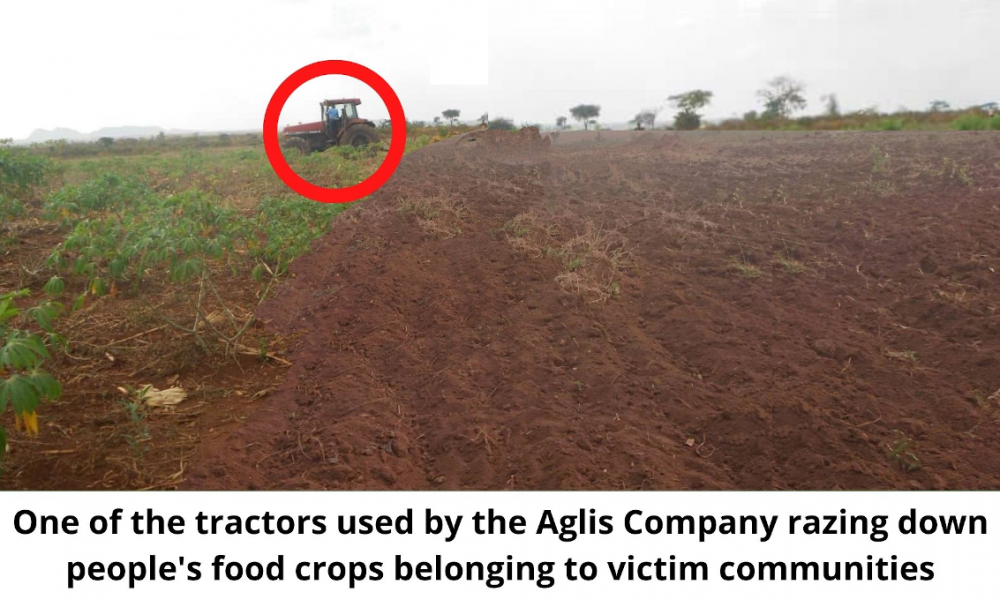WITNESS RADIO MILESTONES
Canada’s Development Finance Institution and Land Grabbing in Africa
Published
3 years agoon
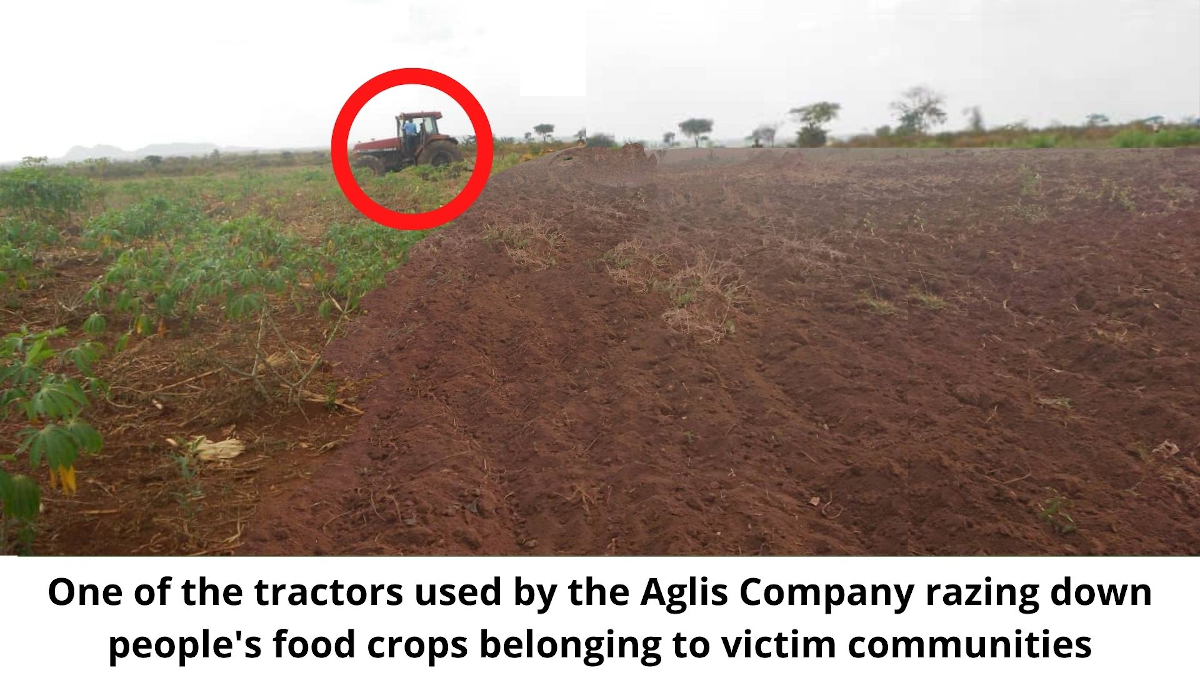
On Wednesday, April 27th, 2022, we caught up with Devlin Kuyek, a researcher at GRAIN, a small international non-profit organization that works to support small farmers and social movements in their struggles for community-controlled and biodiversity-based food systems, and Geoffrey Wokulira Ssebaggala, the Director of Witness Radio Uganda, a not-for-profit national organization which combines both media approaches and legal aid support to mobilize, connect and empower small holder farmers to speak with one voice against land injustices and push for equitable access to opportunities and resources.
This interview is part of a series with the Blended Finance Project a group of unions, non-governmental organizations and academics who are concerned about the Canadian government’s embrace of what is called “blended finance.” We argue that blended finance is merely the latest iteration of the privatization and financialization of foreign aid and seek to engage others in Canada and around the world to propose more equitable public alternatives.
Adrian Murray (AM) and Susan Spronk (SS): In the Blended Finance Project, we have documented how blending uses public money to leverage private money and to shift the risk of investment from the private to the public sector by subsidizing commercial actors. Witness Radio and GRAIN have been supporting communities negatively affected by the very harmful role that unaccountable private equity firms are playing in land grabbing throughout the world, a process which is often facilitated by public development banks and development finance institutions (DFIs). How are blending and other so-called innovative finance mechanisms implicated in these land grabbing deals?
Devlin Kuyek (DK): GRAIN’s focus is on food and agriculture, but blending is a common trend unfolding in multiple sectors. In many countries in the global South, food systems are still largely in the hands of small-scale food producers: farmers, pastoralists, fisher folk. Markets are managed and controlled by small vendors. These food systems do a great job of providing people with nutritious food. They’re sustainable and they’re low emission. But they do not serve the interest of corporations because there’s no room there for corporations to profit. These are the kinds of growth areas where multinational food and agribusiness corporations and financial firms are looking to grow, that is, ‘frontier markets’. Some corporations call this initiative ‘digging into the pyramid;’ the bottom of the pyramid, where most people are.
Now in these areas investment is not so easy: there are difficulties with infrastructure, land conflicts, etc. Expanding agribusiness there involves dispossessing people from their land. It’s risky from a corporate point of view, and they have more difficulties attracting finance to move into these areas. The development banks play a key role in providing that kind of investment, which is where they come in. They’ll provide loans or even equity investments in some of these companies that are operating in these ‘frontier areas’, that provides a bit of a guarantee to other investors who might come in via pension funds or other institutional investors. So, development banks actually play a major role in expanding agribusiness into these areas and that’s why they’re so involved in land grabbing, in the destruction of local markets and all kinds of other conflicts that we see.
Geoffrey Wokulira Ssebaggala (GWS): This kind of development creates a lot of conflict. I’ve just returned from court in the countryside, Kiryandongo in Uganda. For the last two years we’ve been pushing and supporting civil court cases that were filed by communities that are being forcefully evicted by multinational agribusiness companies – American, Indian and many others. We are happy that the cases are finally being heard. It’s been a long struggle.
AM and SS: Canada established a development finance institution called FinDev in 2017 headquartered in Montreal, Quebec. What has been the track record of FinDev thus far?
DK: I’ve looked mainly at their investments in Africa in the food sector. This sort of ‘new’, innovative financing institution is, interestingly enough, involved in old colonial style projects: several of their investments are involved in plantations on large areas of land.
One of FinDev’s investments is in a company called Miro Forestry, which has large-scale industrial tree plantations on 21,000 hectares in Sierra Leone and 10,000 hectares in Ghana. In both instances there are land conflicts with local communities. In Sierra Leone, the contracts that they signed for the leases over the lands stipulate that the company pays the communities only two dollars per hectare, per year for this loss of their lands. With these deals, communities lose their ability to gain livelihoods from these areas. Miro Forestry establishes tree plantations, so there’s very little job creation. The communities are saying that the company has not lived up to even the meager promises they made: to build schools, to provide social services, decent jobs, etc. These areas are now fenced off so that communities have trouble accessing the water sources and other resources that they used to have access to. They have difficulty even accessing the road that cuts through the area. In Ghana, there are similar complaints: lack of consultation; people’s crops were destroyed when the company moved in and took over the lands, etc.
By building these tree plantations, the company is also selling carbon credits. These deals allow some of the worst polluters on the planet to purchase carbon credits so they can keep on polluting. It is part of their business model. This form of ‘development’ thus involves taking away the land and resources that people could have for local food production in countries that will be hardest hit by the climate crisis. The local communities become dependent on food imports. And the profits go mainly to foreign investors that are involved.
DFIs are also investing in private equity funds. This is a growing trend in Africa and elsewhere where you see private equity companies established through offshore structures, operating through tax havens, who charge huge management fees. One particular fund that FinDev is invested in is managed by Phatisa, a company based in Mauritius. They have these fee structures whereby a large portion of whatever profits come out of this end up with the fund managers. They also seek very high returns so the investments that are being made by these development banks through them are seeking high returns in food and agriculture in Africa, meaning they’re extracting a lot of the wealth that could be generated from food and agriculture on the continent and taking it out of the countries and the continent. They’re also invested in some large, multinational food and agribusiness corporations like the Export Trading Group. It’s hard to understand why the Canadian government is providing a subsidized form of finance to a multinational corporation in order for it to expand into Africa in this way.
AM and SS: Turning to the effects of blending on local communities, can you tell us why it’s been so difficult for communities that you work with and others to hold these development finance institutions accountable?
GWS: We have been trying to establish whether FinDev is active in Uganda, but we do not know.
It is difficult to get information about who is funding what never mind holding the companies and institutions involved accountable. Our experience is that neither the development finance institutions, nor the companies and private equity firms that they finance, engage with local communities from the word ‘go’. Local communities don’t decide which projects they should have. These institutions do not seek community consent regarding what projects take place on their land. It is a very violent process. People lose everything from their livelihoods to social well-being because of these investment projects.
In the Ugandan context, the field of investment is marred with a high level of corruption. Information about investment is hidden from communities until organizations like Witness Radio, GRAIN and a few others do background checks to establish where the money is coming from to evict these communities. And, of course, the journey to get a remedy, is not an easy journey. Internal accountability mechanisms, take a lot of time. Resorting to domestic courts is another horrible experience one can talk about. So, yeah, there is a lot that really needs to be done.
DK: Development banks like to portray themselves as being held to a higher level of environmental and social governance standards. Some of them even have grievance mechanisms in place. Our experience is that these do nothing to address the huge power imbalance that exists between the companies they invest in, who are very often closely aligned with local elites, and the marginalized communities where they operate and are taking land.
Take the case of Feronia. It’s a Canadian-based company traded on the public stock exchange – now bankrupt – but operating oil palm plantations on over 100,000 hectares of land in the Democratic Republic of the Congo. For years and years, communities issued statements and memorandums, documented human rights abuses, environmental violations and egregious labor violations, thereby exposing many illegalities when it came to the land occupation. And the development banks, who actually had majority control of this corporation for several years, did nothing but parrot the words of the executives who were not even based locally. There was no serious effort to investigate the actual allegations that were being made.
It came to a point where a grievance was filed for a mediation process by 11 of the affected communities, which was accepted by the international complaints mechanism of the German and Dutch development banks (the French development bank is also now part of it). That process has dragged on for three years now. In the midst of that process the development banks exited entirely, handing the company over to a private equity fund. It was just completely unaccountable to anyone. The reports coming out of human rights abuses remain as egregious as ever, but this complaint mechanism now has very little teeth. So even in a best-case scenario where there is a grievance process, there is almost no accountability.
AM and SS: Given what you’ve told us about DFIs, including FinDev Canada, what would you argue: should these institutions be reformed or just abolished. And if abolished, what would you like to see in their place? What do we need?
DK: Well, our focus is on food and agriculture. Development finance is fundamentally about providing more investment and finance. It’s about channeling money, more money. A lot of it going toward the expansion of corporate agribusiness. It’s structured in a way that makes it impossible to imagine how that money could go towards funding agroecology, land redistribution, the functioning of smallholder markets and local food systems, farmer seed systems. FinDev is about creating the sort of corporate profit structures and industrial agricultural models of production that have nothing to do with the needs and interests of local communities, which is supposed to be what these funds are set up to do.
Development finance institutions like FinDev are, in a sense, a colonial holdover, and that’s why they fund things like plantations. After 300 years of experience with plantations, it’s very difficult to imagine how any institution concerned with development could think that that would be an appropriate investment and yet that’s what they’re committed to and doing. So, in our view, we don’t need more of these development banks. They should be abolished. That’s not where public money should be going.
If Canada and other countries are interested in supporting different systems that that are able to deal with the climate crisis, that are able to get over some of the systemic and structural issues that are the cause of poverty and that are plaguing local communities, so that their needs are actually met, we need a totally different mechanism. And those mechanisms should be in some way accountable to the people that they are supposed to be serving. At a minimum, such a mechanism requires a governance structure with a very strong voice and representation within the decision-making for the communities that they’re supposed to be serving. We are very far from that now.
GWS: I don’t know how best we can reverse this. First, we need development finance institutions and banks to accept the mistakes that they’ve made and then they need to come up with clear, straightforward plans on how they are going to fix these problems.
Second, there must be close supervision and monitoring of where the money has been pumped into, and what it’s doing. Institutions and investors must follow due process. Because they seem to claim that they follow environmental protections, human rights protections and many other things, they do not have a clear plan for monitoring where the money goes. Monitoring and enforcement needs to happen from day one.
Third, we need development banks to bring real development. If the majority of local communities continue to lose their land to investors, people will target those international investments with demonstrations and strikes. And therefore, there’s no sustainable future for these kinds of investments that operate in countries like Uganda. Doing meaningful, responsible business should be the starting point if they want to protect their investments and also their profits.
AM and SS: A statement that was signed by over 80 civil society organizations issued in October of 2021 in advance of the Finance in Common Conference on Agriculture that was being organized by the public development banks states the following: “we call for the creation of a fully public and accountable funding mechanisms that support people’s efforts to build food sovereignty realize the human rights of food, protect and restore ecosystems and address the climate emergency.” What does this funding mechanism look like? Can you provide an example?
GWS: It’s very difficult right now to determine or define how best this should be done. Right now we are strategizing on how best to make the current financial actors accountable to communities. In Uganda we in communities can’t rely on the government. They have disappointed us. But nor can we trust the financiers, because they’ve taken away our land our livelihoods. It’s a mess.
DK: I don’t think there’s one existing case that would match with the ideal articulated in the statement. But, it is still a vision worth striving for. As Geoffrey notes, most governments do not seem interested.
Instead, governments are involved in the current push towards blended finance. Blended finance is all about ensuring that any state project is ultimately backed by people, so we have the final responsibility for it. But it’s our money. The risk is all taken by the government and the people. And the private sector has control and makes the profits.
With blended finance, development finance is making an already atrociously corrupt situation even worse. More money is not going to resolve this problem. So, there is certainly a need for international solidarity. Right now, the context is so toxic and corrupt that the real thing that we need to do as Canadians right now is to make sure that there is no way that any public money in our name goes to make matters worse for people on the ground.
There’s a great photo that Witness Radio took in Kiryandongo that captures what the development finance model is accomplishing right now. You see a tractor from the company which has received money from a development bank, after a forceful eviction of the people, plowing up their cassava crop, which is a very sustainable, important local crop. They’re destroying it in order to be able to plant corn or maize or soybeans for export.
Whatever shape this new, public, accountable finance mechanism takes, whether a government program, bilateral aid or some kind of small grant fund that is able to support communities, the fund needs to be accountable to the local people, be respectful of their control over their land, resources and territories. We need to build from these principles and demand that our governments create such mechanisms. •
Adrian Murray is a SSHRC post-doctoral fellow at the University of Johannesburg researching labour and social movement opposition to the neoliberal restructuring of public services.
Susan Spronk teaches international development and global studies at the University of Ottawa.
Original Source: Socialistproject.ca
Related posts:
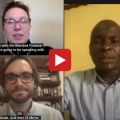
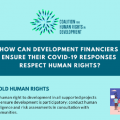 Development finance for Covid-19 crisis should uphold human rights
Development finance for Covid-19 crisis should uphold human rights
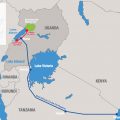 CSOs urge banks and other IFIs not to finance E.Africa oil pipeline project…
CSOs urge banks and other IFIs not to finance E.Africa oil pipeline project…
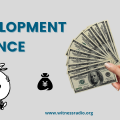 Signs of harmful projects with financing from development institutions are spotted in Uganda…
Signs of harmful projects with financing from development institutions are spotted in Uganda…
 Africa Development Bank creates $10 bn fund for virus aid
Africa Development Bank creates $10 bn fund for virus aid
You may like
WITNESS RADIO MILESTONES
Top 10 agribusiness giants: corporate concentration in food & farming in 2025
Published
3 weeks agoon
June 19, 2025
Today a handful of agribusiness corporations have consolidated unprecedented control over the world’s food supply, with devastating consequences for farmers, consumers and the planet. A new report by ETC Group and GRAIN examines the state of corporate concentration in six sectors critical to agriculture: commercial seeds, pesticides, synthetic fertilisers, farm machinery, animal pharmaceuticals and livestock genetics.
Corporate consolidation is increasing in most of these sectors and four of them– seeds, pesticides, agricultural machinery and animal pharmaceuticals– now meet the definition of an oligopoly, in which four companies control more than 40% of a market. Concentration can be even higher at the national level, as is the case with synthetic fertilisers.
Top findings from the report include:
- Oligopolies dominate key sectors: Bayer, Corteva, Syngenta, and BASF control 56% of the global commercial seeds market, and 61% of the pesticides market.
- Profiteering amid global crises: Agribusiness giants have exploited crises like the Ukraine war and the COVID-19 pandemic to inflate prices. Fertiliser companies, for instance, saw revenues soar by 57% from 2020 to 2023, with some accused of price gouging.
- Digital and biotech expansion: Corporations are rapidly integrating AI, gene editing, and digital platforms into agriculture through partnerships with Big Tech companies. These technologies enable data extraction from farmers, facilitate carbon credit schemes, and tighter control over food systems—while raising concerns about biosafety, privacy, and corporate monopolies.
Source: grassrootsonline
Related posts:

 A corporate cartel fertilises food inflation
A corporate cartel fertilises food inflation
 Food inflation: The math doesn’t add up without factoring in corporate power
Food inflation: The math doesn’t add up without factoring in corporate power
 African governments are giving in to corporate pressure and undermining local seed systems – report
African governments are giving in to corporate pressure and undermining local seed systems – report
 The United Nations Food Systems Summit is a corporate food summit —not a “people’s” food summit
The United Nations Food Systems Summit is a corporate food summit —not a “people’s” food summit
WITNESS RADIO MILESTONES
Land grabbers evict 360,000 Ugandans in 2024
Published
8 months agoon
November 20, 2024
A staggering 363,021 Ugandans were displaced due to forced land evictions between January and June 2024, according to a new report by Witness Radio Uganda.
The report documented 90 cases of land evictions during this period, with nearly four incidents occurring weekly, affecting over 15,126 people and threatening 5,060 hectares of land nationwide.
The Central region was the epicenter, recording 52 eviction cases, followed by 24 in the Western region, eight in the Northern region, and six in the Eastern region. Alarmingly, the report estimated that 2,160 Ugandans face eviction daily, with 723 hectares of land at risk of being grabbed every day.
VIOLENCE AND HUMAN RIGHTS VIOLATIONS
Despite government promises and directives from President Museveni to halt evictions, land grabbers have routinely ignored these orders, often resorting to violence. Armed security forces, private militias, and police were reported to have carried out the majority of the evictions.
Of the reported cases, 37 were enforced by armed gangs on behalf of evictors, 25 involved Uganda Police, five were carried out with the participation of UPDF soldiers, and four were linked to private security companies.
“The egregious levels of impunity exhibited by land grabbers have left communities defenseless, creating an environment where their human rights are trampled without consequence,” said Jeff Wokulira Ssebaggala, country director of Witness Radio Uganda.
He called for accountability and justice, warning that the unchecked power of influential individuals and entities leaves marginalized communities vulnerable and without recourse.
DRIVERS OF EVICTIONS: INDUSTRIALIZATION AND LAND-BASED INVESTMENTS
The report identified the government’s push for industrialization and land-based investments as the primary drivers of forced evictions. Land is increasingly targeted for oil and gas extraction, mining, agribusiness and tree plantations for carbon offsets. While some of this land is already under development, other parcels remain vacant but are guarded by military personnel and private security firms.
Ssebaggala emphasized that industrialization must balance economic development with the protection of smallholder farmers’ rights to land and food security.

TRAGIC STORIES
The report highlighted harrowing cases that underscore the human toll of forced evictions. In Nakasongola, smallholder farmer Dan Ssebyala was ambushed and killed by armed men following a confrontation over disputed land. The district has become a hotspot for violent evictions involving absentee landlords and powerful investors.
Ismael Bwowe, a disabled father of 20, recounted how his land was confiscated after he demanded fair compensation. He faced intimidation, arrests and false charges from state authorities, including being accused of robbing an influential individual. Bwowe claimed that Total Energies offered legal support and representation on the condition that he accept their compensation terms.
“I refused,” he said, adding that the pressure to relinquish his land remains intense. The report underscores the urgent need for reforms to address forced evictions, ensure accountability, and protect the rights of vulnerable communities. Without meaningful intervention, Uganda risks deepening inequality and undermining the livelihoods of smallholder farmers who are essential to the country’s food security.
FAMILY JAILED AMID LAND DISPUTE
The plight of Richard Ssebagala, his wife Prossy Namande, and their relative Anania Ngabirano, residents of Kabubu-Kabongo village in Nansana Municipality, Wakiso district, highlights the human toll of Uganda’s ongoing land disputes. The family spent nine months in prison following their arrest on January 10, 2024, under controversial circumstances.
ARREST AND ALLEGATIONS
The arrests occurred at 1am, during a raid by officers from Luweero police station. Police reportedly banged on the doors and forcefully detained the family, accusing them of aggravated robbery. However, the family believes the arrest was a tactic linked to a land dispute with Benon Ntambi, a man who allegedly grabbed their land.
Before the arrests, Ntambi had reportedly destroyed crops, including tomatoes, potatoes, and bananas, on the contested land. While the family was incarcerated, a new building was constructed on their land, which is now occupied, raising further questions about the motivations behind their detention.
CALLS FOR JUSTICE
The case has drawn attention from Witness Radio Uganda, which has urged the government to take immediate action to address land grabbing and illegal evictions. The organization emphasized the need to strengthen land laws and protect vulnerable communities from abuses.
It also called for greater accountability in institutions such as the Uganda Police Force, the army and land registries, which are often accused of corruption and favoritism toward the wealthy.
“The government must prioritize justice for victims of illegal evictions and address systemic corruption that leaves the poor defenseless against land grabbers,” Witness Radio Uganda stated.
BROADER CONTEXT
This case underscores the broader issue of land conflicts in Uganda, where vulnerable families are often caught in disputes with powerful individuals or entities. Advocacy groups warn that the failure to address these issues not only erodes public trust but also perpetuates inequality and injustice.
As the government faces mounting pressure to act, the story of Ssebagala and his family serves as a stark reminder of the urgent need for reforms to protect land rights and ensure justice for those impacted by land disputes.
Source: The Observer
Related posts:

 Local land grabbers evict villagers at night; foreign investors cultivate the same lands the next day
Local land grabbers evict villagers at night; foreign investors cultivate the same lands the next day
 Uganda: Land-grab victim communities will join counterparts in commemorating the 2024 International Day of Struggle Against Industrial Plantations.
Uganda: Land-grab victim communities will join counterparts in commemorating the 2024 International Day of Struggle Against Industrial Plantations.
 Mubende Land Grab: Witnessradio.org presents another petition to Land Inquiry Commission, Wants All Titles being used to evict Natives to be Investigated
Mubende Land Grab: Witnessradio.org presents another petition to Land Inquiry Commission, Wants All Titles being used to evict Natives to be Investigated
 A Nullity? Ugandans Query Constitutional Land Amendment Bill
A Nullity? Ugandans Query Constitutional Land Amendment Bill
WITNESS RADIO MILESTONES
Uganda: Community members violently evicted by security forces, allegedly related to EACOP; incl. co. responses
Published
8 months agoon
November 18, 2024
On 10 February 2023, more than 2,500 community members were forcibly evicted from their land in Kapapi village in Hoima district in Western Uganda by security forces, receiving no compensation or resettlement.
Witness Radio, an Ugandan non-profit organisation comprised of human rights investigative journalists, lawyers, and social workers, said that many people were wounded during the eviction, women were raped, and houses were destroyed.
Witness Radio said its investigations found that this eviction occurred to clear the path for the Tilenga feeder pipeline, part of the East African Crude Oil Pipeline (EACOP). According to Witness Radio, in 2022 Kapapi community members’ land was surveyed for the Tilenga pipeline and people were informed they would be compensated for the land. Instead, they were forcibly evicted, which Witness Radio allege was backed and financed by Swacoff Intertrade Company Limited, known to TotalEnergies. They also allege that guards from private security company Magnum Security were involved. Witness Radio has also found that dozens of local farmers who were evicted have been arbitrarily arrested and face criminal charges.
The Business & Human Rights Resource Centre invited TotalEnergies, Swacoff Intertrade Company Limited, and Magnum Security to respond to the allegations. TotalEnergies responded and stated that no land eviction activities had been carried out by or on behalf of TotalEnergies EP Uganda (TEPU) and EACOP Ltd and that none of the affected people are Tilenga or EACOP Project Affected Persons. Swacoff responded and said that the company has never engaged in forceful eviction of any sort and asserts that these allegations are completely false. Their full responses and rejoinders from Witness Radio are available below. Magnum Security did not respond.
Related posts:

 Uganda: NGO claims Agilis Partners & Great Seasons violently evicted locals to pave the way for agribusiness; Agilis Partners responds
Uganda: NGO claims Agilis Partners & Great Seasons violently evicted locals to pave the way for agribusiness; Agilis Partners responds
 A son of the community defender is shot dead, another critically injured in a retaliatory attack by security guards evicting locals off their land to give way to large-scale sugarcane growing.
A son of the community defender is shot dead, another critically injured in a retaliatory attack by security guards evicting locals off their land to give way to large-scale sugarcane growing.
 Breaking: Criminal trial for seven community defenders opposed to EACOP/Tilenga project forced land eviction has been fixed.
Breaking: Criminal trial for seven community defenders opposed to EACOP/Tilenga project forced land eviction has been fixed.
 Uganda: CSOs claim Agilis Partners forcibly evicting local communities to pave way for agribusiness; company did not respond
Uganda: CSOs claim Agilis Partners forcibly evicting local communities to pave way for agribusiness; company did not respond

Land Grabbing Crisis Escalates in Uganda: Mayiga Urges Citizens to Secure Land Documents

Seizing the Jubilee moment: Cancel the debt to unlock Africa’s clean energy future

Activism on Trial: Despite the increasing repressive measures, Uganda’s EACOP protesters are achieving unexpected victories in the country’s justice systems.

Communities Under Siege: New Report Reveals World Bank Failures in Safeguard Compliance and Human Rights Oversight in Tanzania

A decade of displacement: How Uganda’s Oil refinery victims are dying before realizing justice as EACOP secures financial backing to further significant environmental harm.

Govt launches Central Account for Busuulu to protect tenants from evictions

Activism on Trial: Despite the increasing repressive measures, Uganda’s EACOP protesters are achieving unexpected victories in the country’s justice systems.

Top 10 agribusiness giants: corporate concentration in food & farming in 2025

Innovative Finance from Canada projects positive impact on local communities.
Over 5000 Indigenous Communities evicted in Kiryandongo District
Petition To Land Inquiry Commission Over Human Rights In Kiryandongo District
Invisible victims of Uganda Land Grabs
Resource Center
- LAND GRABS AT GUNPOINT REPORT IN KIRYANDONGO DISTRICT
- RESEARCH BRIEF -TOURISM POTENTIAL OF GREATER MASAKA -MARCH 2025
- The Mouila Declaration of the Informal Alliance against the Expansion of Industrial Monocultures
- FORCED LAND EVICTIONS IN UGANDA TRENDS RIGHTS OF DEFENDERS IMPACT AND CALL FOR ACTION
- 12 KEY DEMANDS FROM CSOS TO WORLD LEADERS AT THE OPENING OF COP16 IN SAUDI ARABIA
- PRESENDIANTIAL DIRECTIVE BANNING ALL LAND EVICTIONS IN UGANDA
- FROM LAND GRABBERS TO CARBON COWBOYS A NEW SCRAMBLE FOR COMMUNITY LANDS TAKES OFF
- African Faith Leaders Demand Reparations From The Gates Foundation.
Legal Framework
READ BY CATEGORY
Newsletter
Trending
-

 SPECIAL REPORTS AND PROJECTS5 days ago
SPECIAL REPORTS AND PROJECTS5 days agoActivism on Trial: Despite the increasing repressive measures, Uganda’s EACOP protesters are achieving unexpected victories in the country’s justice systems.
-

 NGO WORK2 weeks ago
NGO WORK2 weeks agoCommunities Under Siege: New Report Reveals World Bank Failures in Safeguard Compliance and Human Rights Oversight in Tanzania
-

 SPECIAL REPORTS AND PROJECTS1 day ago
SPECIAL REPORTS AND PROJECTS1 day agoSeizing the Jubilee moment: Cancel the debt to unlock Africa’s clean energy future
-

 MEDIA FOR CHANGE NETWORK1 day ago
MEDIA FOR CHANGE NETWORK1 day agoLand Grabbing Crisis Escalates in Uganda: Mayiga Urges Citizens to Secure Land Documents

